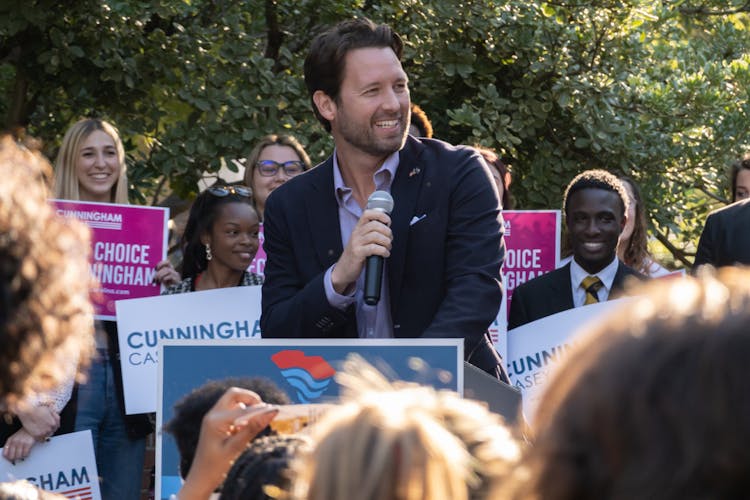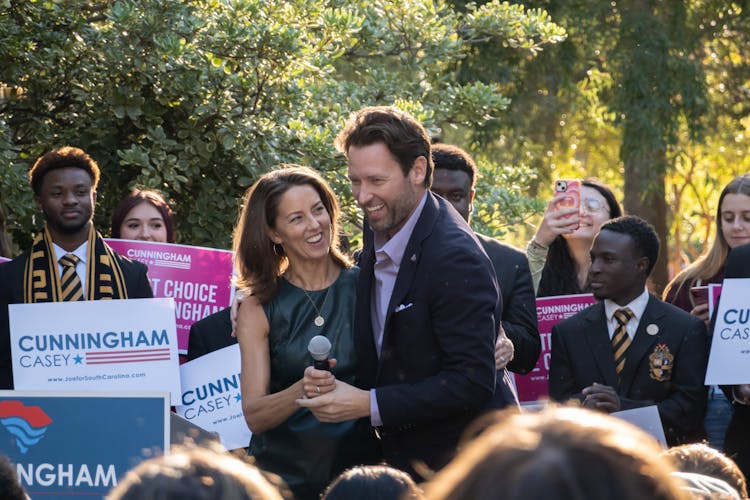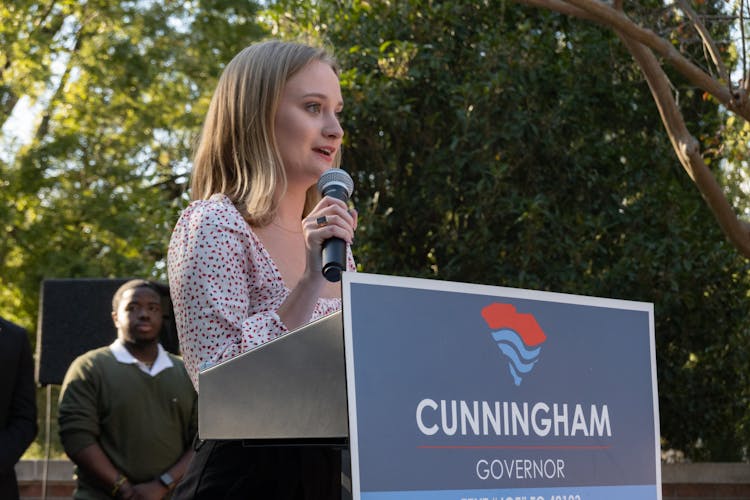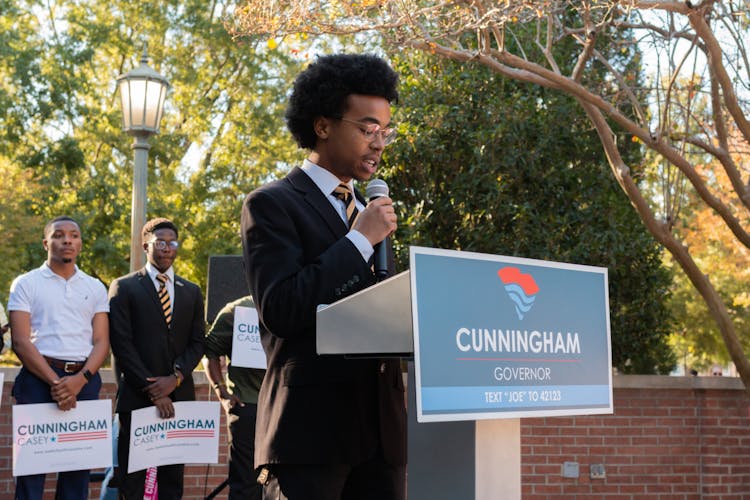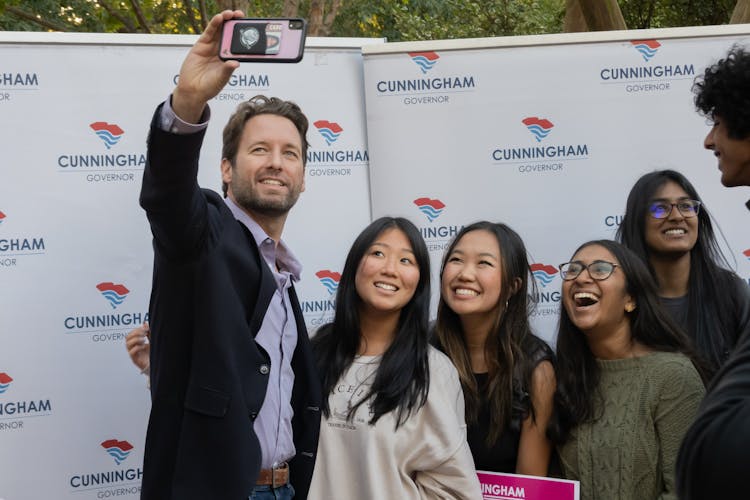Democratic candidate for S.C. governor Joe Cunningham visited USC on Oct. 20 to encourage turnout in the upcoming election, as well as talk about his stances on abortion, education and legalizing marijuana and sports betting.
Cunningham's appearance outside Russell House was sponsored by the Theta Nu Chapter of Alpha Phi Alpha Fraternity. It is part of an ongoing tour of college campuses across the state, which began at the College of Charleston on Sept. 8 and includes stops at Furman and Clemson scheduled for Oct. 21.
Cunningham said it was “great to be back on campus” and that the experience reminded him of being in college. He thanked everyone in the audience for being at the event, saying that every person had their own reasons for showing up.
“Some of you may be showing up for something bigger. Something larger. For me personally, like, I show up actually for someone smaller,” Cunningham said, referring to his four-and-a-half-year-old son Boone. “And right now, I’m concerned about what South Carolina is going to look for him.”
Cunningham said his son's teacher was one of many in South Carolina who have left the school system amidst a teacher shortage in the state. According to The Post and Courier, as of February, there were 1,121 teaching vacancies statewide. This is the highest number recorded in 21 years.
Cunningham said while he understands why there's a shortage, students who are used to seeing their teachers every day only for them to suddenly disappear are left feeling confused and stranded in the classroom.
“We don’t know the trauma and the impact that’s having on all our kids, because we’re not just talking about teachers or jobs or numbers. We’re talking about real people,” Cunningham said.
Cunningham said teachers are leaving in droves because politicians are failing them by underpaying them and "not doing what they said they're gonna do." He said he wants to give all teachers a 10% raise and bring the starting yearly salary up to $50,000 by the end of his administration.
To pay for these costs, Cunningham plans to legalize, regulate and tax marijuana and sports betting. He said marijuana use is not uncommon, despite it not being legalized.
“It’s already happening in South Carolina anyway. It’s probably happening in those rental homes right now as we speak,” Cunningham said while pointing to the dorms around campus.
Another central stance of Cunningham's campaign is supporting abortion rights in the state.
"We’re talking about giving women, allowing women the freedom to control their very own bodies,” he said.
Cunningham is opposing sitting Governor Henry McMaster, who has held the office since 2017. The candidate said McMaster is stuck in the past, which is keeping South Carolina from progressing into the future.
"He's been a politician, literally longer than I’ve been alive,” Cunningham said. “McMaster has been leading our state into the 1950s since the 1980s. That’s how long he’s been doing this.”
McMaster first became involved in politics as a legislative assistant to S.C. Senator Strom Thurmond in 1973, according to the governor's office website.
Cunningham said he wanted to provide more jobs in South Carolina so people won’t migrate for work. He said students like those at USC move to Charlotte, Atlanta or New York when those desired jobs could be in South Carolina.
Tally Casey, the Lieutenant Governor candidate running alongside Joe Cunningham, also spoke at the event.
Casey said she was always interested in campaigning but was a bystander until the recent Dobbs v. Jackson Women’s Health Organization U.S. Supreme Court decision in June 2022, which overturned the constitutional right to abortion, revoking the effects of Roe v. Wade.
After hearing of the decision, Casey said she knew she had to take action and move to the forefront.
She said South Carolina needs “somebody who can connect with the young people, with the future of this state.”
“We’re talking about, our governor wants to ban all abortions with no exceptions whatsoever for rape, for incest or for the life of the mother,” Casey said, referring to McMaster.
Casey said she fears abortions will not be the last freedom that is removed from communities. While she and Cunningham were at the annual Pride Parade in Columbia, she said they spoke to a large group of attendees who were worried South Carolina could be the next state to pass a “Don’t Say Gay” bill.
Florida Gov. Ron DeSantis signed the “Parental Rights in Education” bill, named the “Don’t Say Gay” bill by opponents, limiting the instruction of sexual orientation or gender identity in kindergarten through third-grade classrooms in March 2022.
Rachel Forney, a fourth-year public relations student who works under the Vice President in Student Government, also spoke at the event.
“After years of polarizing politics, and with so many of our freedoms on the line. I knew that I could no longer sit on the sidelines. I needed to be involved in this election,” Forney said.
Forney said that Cunningham and Casey are determined to return reason and empathy to politics, “something that is long overdue,” she said.
She asked that all students vote in the midterms as a way to preserve our freedoms.
At the end of the event, Cunningham encouraged all attendees to vote in the upcoming election.
"It's gonna be a fight on Nov. 8, but we're up for the challenge," Cunningham said. "This is our future, folks, let's take it."
Editor's note: Caleb Bozard contributed to the reporting in this article

